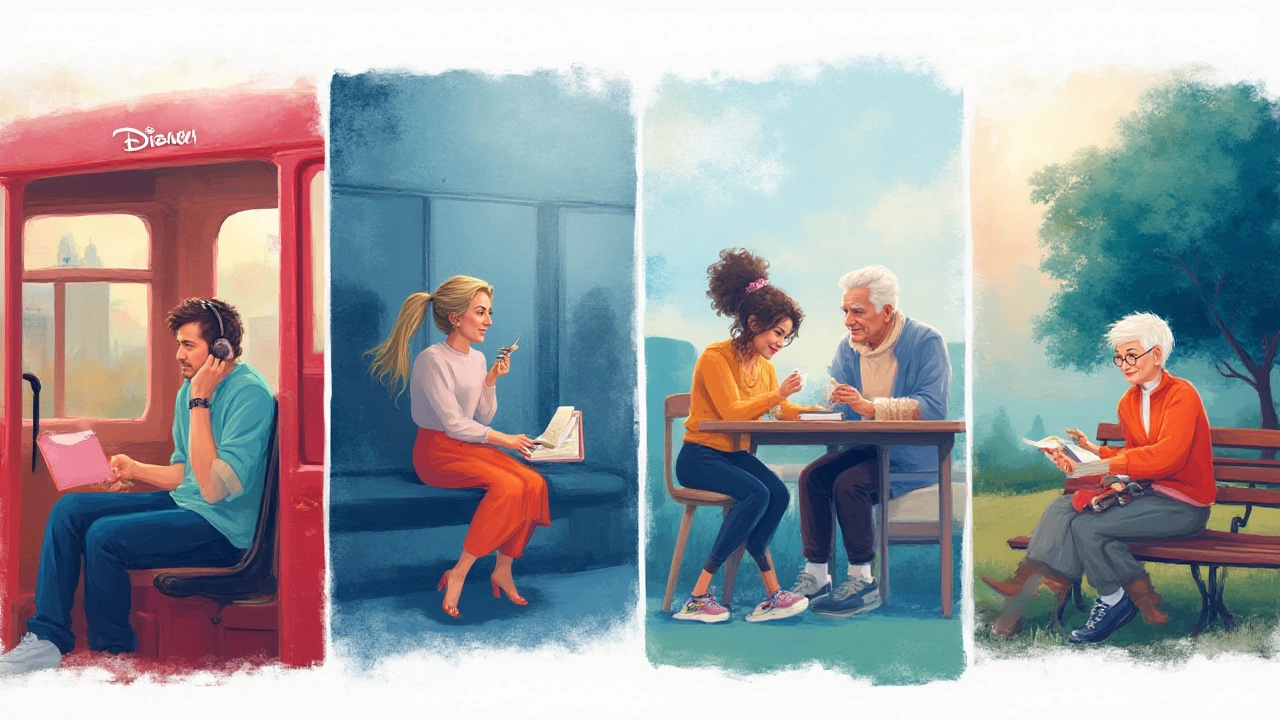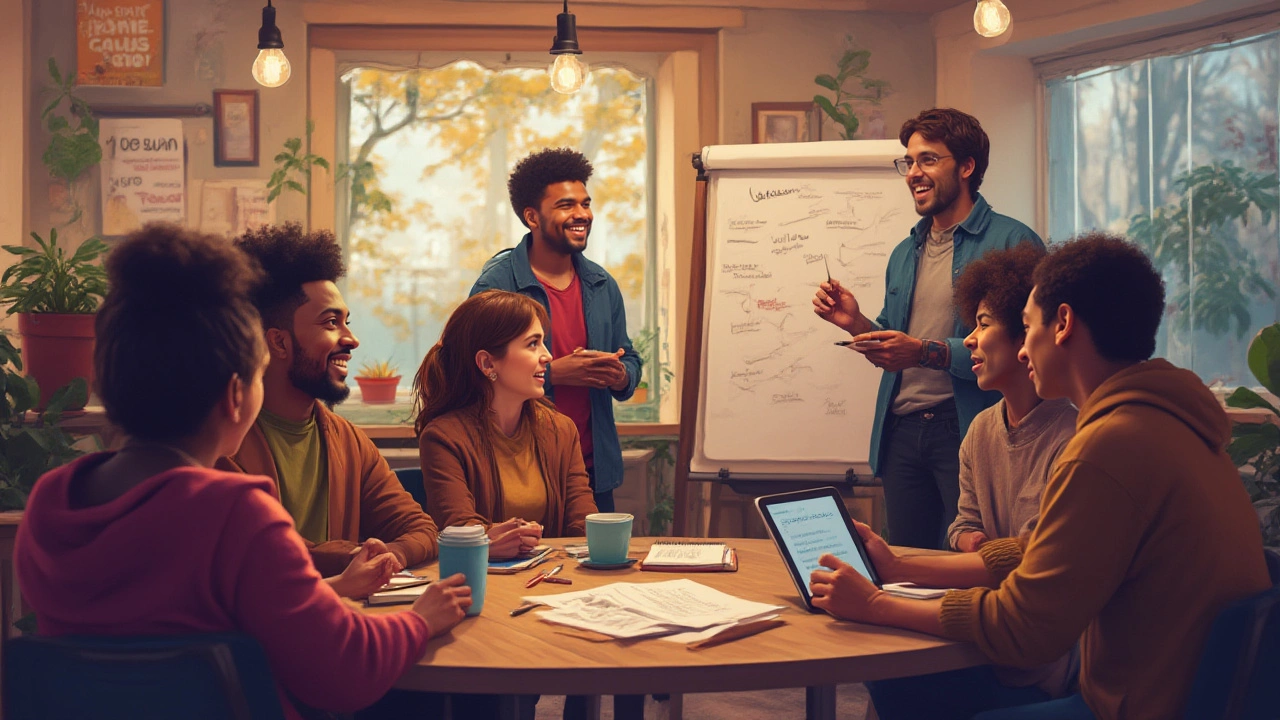When was the last time you learned something new—not just for work, but for yourself? Forget the image of stuffy classrooms filled with bored faces; adult learning is nothing like those old-school memories. The real deal looks more like juggling online courses at midnight, trading stories in community groups, or picking up skills from YouTube hacks and TikTok tips. Adults chase knowledge everywhere, not just in classrooms.
What Makes Adult Learning So Different?
Here’s a shocker: adult learning, also called "andragogy," isn’t about memorizing what someone else says just because they’re the ‘teacher.’ Forget spelling tests and silent reading time. Adults bring their own lived experience to the table. They want learning that feels useful, something they can apply today—not ten years from now.
Malcolm Knowles, a big thinker in this realm, nailed down what makes adult learning tick: adults are driven by real-life problems, not by grades or gold stars. They want answers that actually fix headaches, like managing their money, switching careers, or parenting better. That’s why adult learning usually feels more relevant and engaging. For instance, when you take a weekend workshop on stress management and actually use tips on your job Monday morning—boom, that's adult learning working the way it should.
Some surprising stats? The UNESCO Institute for Lifelong Learning reported in 2024 that over 80% of people aged 30+ learn informally—not in a school, but through work, hobbies, or even chatting with friends. And forget the old myth that adults are ‘too set in their ways’: scientists found adult brains actually stay remarkably adaptable. Yep, neuroplasticity doesn’t just vanish after high school.
How Adults Actually Learn
Classrooms with desks in rows? That’s not how most adults get things done. Learning as an adult works better when it’s hands-on, collaborative, and—even better—when there’s a real “why” behind it. People want to know: What’s in it for me? If you’re showing up to a painting class, it’s probably to destress, not impress. If you’re taking coding lessons, maybe it’s for that next job.
Adults learn best when they can connect new info to what they already know. Ever noticed how you remember baking a new recipe way better if you’re a seasoned home cook? That’s because your brain already has a map for those skills. Adults are constantly making connections between fresh info and their own expertise. It means learning isn’t just about collecting facts—it’s about weaving them into stories and daily life.
Self-direction is another key. Research from Harvard’s Division of Continuing Education showed that over 60% of adults prefer online self-paced courses so they can fit studying around jobs, parenting, or just binge-watching shows. They want to choose topics, set goals, and decide what matters. There’s power in being in the driver’s seat.
And get this: motivation looks different for grown-ups. It’s less about impressing others and way more about solving real-world problems. Adults are practical. If the material isn’t relevant or feels like busywork, people drop out or tune out—fast. That’s why adult education programs that focus on problem-solving and real scenarios tend to keep learners engaged.

Barriers to Adult Learning: Why Isn’t Everyone Doing It?
It’s tempting to say, "Just go out and learn!" But life gets complicated. Kids, bills, work, maybe even caring for aging parents—adults juggle a lot. According to a 2025 World Bank survey, time and cost are the two main roadblocks. For many people, it isn’t about laziness or lack of curiosity; it’s the mess of real life getting in the way.
There’s also a confidence gap. After years away from classrooms, many adults worry they’ve forgotten how to learn. This is a myth—your brain hasn’t forgotten, but traditional school settings might have made you think otherwise. Also, digital skills can get in the way. With so much learning now online, folks who didn’t grow up with laptops sometimes feel lost. In a recent Pew Research poll, 35% of adults over 45 said they found online learning platforms confusing or overwhelming at first.
And then there’s the “Am I too old?” myth. Not even close. Studies from the University of Toronto found adults in their 50s and 60s picked up complex new skills (like languages and instruments) just as well as younger folks—if they practiced regularly and had support.
Adult learning often picks up steam when workplaces chip in help or governments offer subsidized programs. In Finland, for example, 73% of working adults took part in job training last year thanks to a national push. In countries without that support, fewer adults join in.
Tips to Make Adult Learning Stick
Let’s get practical. Want your new skills to last longer than your New Year’s resolutions? Here are real, battle-tested steps to help learning fit your life:
- Connect new knowledge to real-life goals. Learning French for fun? Plan a call with a French friend each week. Tying learning to something concrete makes it feel real.
- Don’t go it alone. Join groups, online forums, or study with a buddy. Adults learn better together. Having support keeps you accountable.
- Chunk your time. Got 15 minutes in the morning? Use it. Tiny bursts add up. University College London found people who spaced learning in short sprints kept more info than marathon sessions.
- Reflect often. Briefly ask yourself, “How would I use this?” That reflection cements learning, turning lessons into habits.
- Embrace mistakes as fuel. Adults love to play it safe, but research from Stanford shows risky learning—like trying conversation before you feel ready, or failing a code—drives way more growth.
- Mix methods. Watch videos, listen to podcasts, read, write, and practice. The more ways you learn, the stickier it gets.
- Give yourself credit. Track your progress, celebrate milestones, and reward your effort. It primes your brain to crave more challenges.
Learning doesn’t need to be epic or glamorous. Try cooking one new meal a week, fix your bike yourself, dabble in 3D printing, or join a free language exchange. Every small win builds up your confidence and curiosity.

Fascinating Facts & Research About Adult Learners
If you still think adult education is a snooze, check out these eye-openers. In Germany, companies reported a 9% productivity boost when workers regularly learned on the job. Adobe’s Digital Economy Index showed digital skills courses for people past 40 surged 170% between 2022 and 2024.
| Country | % Adults in Formal Learning | % Adults in Informal Learning | Top Obstacle |
|---|---|---|---|
| Finland | 73% | 92% | Time |
| USA | 58% | 86% | Cost |
| Japan | 40% | 85% | Lack of Support |
And here’s something wild—adults who take up learning new tech or languages report feeling “mentally sharper” and less lonely, according to AARP’s 2024 Brain Health Survey. In fact, social learning (like group book clubs or choir practices) is linked with higher well-being, not just new knowledge.
Employers have finally caught on. A 2025 Gallup poll found that more than half of adults in the workforce said access to learning opportunities kept them from quitting their jobs. Lifelong learning is seriously good for business and personal growth.
Some libraries are now running repair cafes where people learn to fix toasters, bikes, or computers together. Others give out free digital literacy classes—because being able to spot scams or use e-health tools is vital now, especially for those 55+.
If there’s one thing to take away? Nobody “ages out” of learning. The drive to understand, create, and adapt never goes away. In a world moving this fast, keeping your mind and skills fresh is a superpower you can choose at any age.

